What to know
- The Trump administration's aggressive global tariff regime against imported goods from some of its closest allies has drawn strong reactions across the board.
- Long-standing U.S. allies across most of the world's largest economies reacted with a mixture of anger and despair as they vowed retaliatory tariffs and hinted at some of the measures they plan to use to soften the blow to their own economies.
- Countries seeking to sell goods to the United States will face taxes as high as 54% based on how the White House is calculating duties on U.S. exports, as well as "nonmonetary" trade barriers in response to countries' doing such things as manipulating their currencies or serving as "pollution havens."
- Global markets reacted sharply and swiftly, with investors pulling money out of U.S. shares and the stocks of other companies that rely on global supply chains.
- The steep tariffs are raising consumer fears that higher prices are on the way, with the industrial, retail, consumer and automotive sectors all feeling the pain.
Administration officials and their allies offer conflicting messages
Trump this week officially fulfilled a campaign promise to unleash sweeping tariffs, a move that has sparked fears of a global trade war and prompted a major question about what has become the centerpiece of his economic agenda: What’s his endgame?
In both size and scope, Trump’s ultimate blueprint for global tariffs — a 10% baseline tariff on virtually every country, with higher numbers on countries with which the United States has larger trade deficits — was more than most expected. It has left global financial markets tumbling and Trump’s Republican supporters trying to thread the political needle of not criticizing him while also understanding the economic peril the tariff plan may usher in ahead of 2026 midterm elections in which the GOP will try to defend its slim House and Senate majorities.
Trump’s team has so far not had a clear message to either explain the strategy behind the tariffs that his political allies can echo or his thought process behind the decision to go much further than even supporters were expecting.
What’s more, multiple elements of the sweeping measures made it seem as if the administration rushed through the process.
'Recession pop' re-emerges along with economic worries
Positive, catchy and carefree “recession pop†is back. The chart-topping pop music brought joy to many during the Great Recession in the late 2000s.
And as economic fears return, there's a resurgence of new hits from millennial-era superstars.
Tariffs could cost the average household $3,800 per year
The ripple effects of Trump’s new wave of sweeping tariffs will be felt the most by lower-income people in the United States, who are heavily reliant on products from countries hit the hardest by Trump’s tariffs and have less disposable income to absorb higher prices.
Trump is placing some of his highest tariffs on goods coming from countries making the low-cost products that line the shelves of discount retailers. Products from Vietnam, Sri Lanka and Cambodia, for instance, will have tariffs of more than 40% — that is, now importers will need to pay 40% of the value of those goods to Customs and Border Protection at ports of entry to get them into the country. Goods from China will have a total of more than 70% worth of additional tariffs.
While Trump campaigned on a pledge to lower prices for struggling families, his tariffs are expected to increase the cost of everything from kids’ shoes to fresh produce, according to economists and business executives. The total impact from the tariffs announced since Trump took office could cost the average household $3,800 per year, according to an analysis by the Budget Lab at Yale University.
JPMorgan chief economist: Odds of global recession climb to 60% under plan
The odds of a global recession will rise to 60% if Trump’s tariff plan goes forward as initially presented, according to Bruce Kasman, chief economist at JPMorgan.
Kasman had set the likelihood at 40%.
“We are not making immediate changes to our forecasts and want to see the initial implementation and negotiation process that takes hold. However, we view the full implementation of announced policies as a substantial macroeconomic shock not currently incorporated in our forecasts,†he wrote to clients in a note today. “We thus emphasize that these policies, if sustained, would likely push the [U.S.] and possibly global economy into recession this year.â€
Trump says tariffs may be leverage in TikTok discussions
Trump defended his tariffs to reporters aboard Air Force One today, characterizing his decision to place penalties on imports from more than 180 countries and territories as a negotiating tactic to spur U.S. investments and aid in important business decisions, including the sale of TikTok.
“We have a situation with TikTok where China will probably say, 'We’ll approve a deal, but will you do something on the tariff?' The tariffs give us great power to negotiate," Trump said.
Trump signed an order in January giving TikTok’s Chinese-based owner, ByteDance, until Saturday to sell the platform to a non-Chinese buyer or face a nationwide ban.
Trump told reporters today that “we’re very close to a deal†on TikTok. It is unclear whether Chinese officials have tried to tie the platform to tariffs amid the negotiations over its ownership.
Federal Reserve not likely to rescue markets and economy from tariff turmoil anytime soon
Now that Trump has set out his landmark tariff plans, the Federal Reserve finds itself in a potential policy box to choose among fighting inflation, boosting growth — or simply avoiding the fray and letting events take their course without intervention.
Should Trump hold fast to his tougher-than-expected trade policy, there’s a material risk of at least near-term costs, namely the potential for higher prices and a slowdown in growth that could turn into a recession.
For the Fed, that presents a potential no-win situation.
The central bank is tasked with using its policy levers to ensure full employment and low prices, the so-called dual mandate of which policymakers speak. If tariffs present challenges to both, choosing whether to ease to support growth or tighten to fight inflation won’t be easy, as each courts its own peril.
'A good first step': One industry embraces tariffs
As Trump’s announcement of far-reaching tariffs sent shock waves, many in the nation’s struggling domestic shrimp industry welcomed the move.
The executive director of the Southern Shrimp Alliance, John Williams, said in a statement that the trade association was “grateful†for the administration’s actions.
The president of the alliance, Steve Bosarge, who owns a fleet of shrimp boats in Pascagoula, Mississippi, told NBC News, “I think it’s a good first step for us.â€
Much of the shrimp that’s consumed in the United States is imported. An investigation found that some top exporters, including Ecuador, India, Indonesia and Vietnam, have subsidized or dumped shrimp in the United States. The countries are all subject to Trump’s tariffs.
“I hope that we can work towards leveling the playing field,†Bosarge said. “I hope these tariffs will give some incentives for countries to do what’s right.â€
Leann Bosarge, who works alongside her father, said that fuel is their largest expense and that she wasn’t expecting increased costs to their company. She hopes increased revenue might offset any.
“It was so refreshing to have someone finally realize that we feed America and letting America outsource its food production to the point that your domestic industry can no longer survive — that’s just a bad decision."
More: Stock market plunges after tariff announcement
Markets record worst one-day loss since pandemic
Major U.S. stock indexes had their worst one-day drawdowns since the onset of the pandemic today.
The S&P 500 fell 4.8%, while the Nasdaq fell 6% — their worsts since 2020. The Dow Jones Industrial Average declined 4%, or more than 1,600 points— its worst sell-off since 2022.
Small-cap benchmark Russell 2000 becomes first major U.S. stock measure to enter bear market
Small-cap stocks, which were once thought to be primary beneficiaries of Trump’s policies, entered bear market territory today after a massive stock market rout that followed the administration’s sweeping and aggressive tariff rollout.
The Russell 2000 Index was down about 6%, bringing its losses from its Nov. 25 record close to around 22%. On Wall Street, a 10% pullback is considered a correction, but a 20% decline is a bear market. The S&P 500 and the Nasdaq Composite are both in correction territory, while the Dow Jones Industrial Average is just below that mark.
“They’re getting hit because the economy is softening. That’s going to hurt profits,†Keith Lerner, co-chief investment officer at Truist, told CNBC. “On the other side, they’re still paying high levels of interest payments on debt because they have more of this floating-rate debt.â€
“They’re getting squeezed on both sides,†he said.
The value of the U.S. dollar is dropping hard
The value of the U.S. dollar suffered one of its biggest drops in years today, down as much as 2.2%.
In theory, that's good news for the export-oriented agenda Trump is espousing and which he hopes his tariffs will help put into effect. If the value of U.S. goods goes down, it makes them easier to sell abroad.
But by and large, the United States doesn't have a problem selling goods abroad. Instead, its trade deficit is the product of our ability to buy even more stuff than we sell.
With a weaker dollar, the average consumer in the United States will have less overall buying power.
Notably, White House officials, including Treasury Secretary Scott Bessent, in his confirmation hearing, and Stephen Miran, in a 2024 paper, said that assuming tariffs did cause prices to go higher, the impact to U.S. consumers would be less severe as long as the dollar appreciated in value.
Instead, the dollar is behaving in a way that suggests international markets will have less demand for it, as well as U.S. assets generally.
Trump’s policy can be said to more closely resemble one that would be sought by a developing country that is looking to attract investment, rather than an established, hyper-wealthy nation like the United States.
Trump says things are 'going to boom' amid stock market freefall
Trump insisted that the United States is "going to boom" as stocks plunged in the wake of his decision to impose aggressive tariffs.
Speaking at the White House South Lawn, Trump told reporters that the rest of the world wants to see whether it can make a deal even as other countries discuss retaliatory tariffs. Trillions of dollars in market value were wiped out in the first few minutes of trading this morning.
"The thing that people have to talk about, we have almost a $7 trillion investment coming into our country, and, uh, you’ll see how things turn out, our country’s going to boom," he said.
FTC chairman weighs in on Trump tariffs
"President Trump is reorienting our nation’s economy to put Americans first," Andrew Ferguson said today. "As we adjust to the new economic order, the @FTC will be watching closely to make sure American companies are vigorously competing on prices."
"These necessary tariffs should not be interpreted as a green light for price fixing or any other unlawful behavior. We will always protect American consumers."
S&P 500 loses nearly $2 trillion in market value
The S&P 500 stock index has lost almost $2 trillion in value during today’s trading, according to S&P Dow Jones Indices.
With today’s plunge, the country’s largest 500 stocks have more than doubled their losses for the year. As of yesterday's close, the index had lost $1.75 trillion year to date.Â
About 3 out of every 4 stocks were down in the S&P 500 at around 1 p.m. today.
The damage is even worse in the more U.S.-centric Russell 2000: 95% of the stocks in the small cap index are in the red today, according to data from FactSet. The Russell 2000 is down more than 6% today — putting it in bear market territory.
'This isn't about politics, it's about people's livelihoods,' Paper Plane Coffee Co. owner says
Import taxes on coffee, a product that cannot be replaced at scale within the United States, will "undoubtedly" have an impact on domestic businesses, Paper Plane Coffee Co. owner Jonathan Echeverry said in an impassioned video today.
"This isn't about politics, it's about people's livelihoods and how quickly international policy can ripple through an industry built on relationships, trust and an extremely delicate supply chain," Echeverry said, urging people to contact their representatives.
In a statement to NBC News, Echeverry added that it's not just the import on beans that will hurt his small business, but that Trump's tariffs touch "every single part of the café."
"It’s the cups we serve it in, the lids, the sugar, the stirrers, the sleeves, the equipment we use, even the espresso machines. ... All of that stuff comes from somewhere and all of it gets more expensive when tariffs like these go into place," Echeverry said.
Shares in oil drilling companies down big as oil prices plunge
Alongside tech firms, oil drilling companies are also seeing major sell-offs as the price of oil "crashes" to nearly $65 a barrel.
- Valero: -14%
- Phillips 66: -13%
- Devon Energy: -12%
- ConocoPhillips: -10%
- Occidental: -10%
Mexico cautiously celebrates dodging latest U.S. tariffs
MEXICO CITY — Mexico celebrated today having dodged the latest round of tariffs from the White House taking aim at dozens of U.S. trading partners around the world, but was also quickly reminded that in a global economy the effects of uncertainty can’t be entirely avoided.
President Claudia Sheinbaum said the free-trade agreement signed by Mexico, Canada and the U.S. during Trump’s first administration had shielded Mexico.
Now her government will focus on the existing 25% U.S. tariffs on imported autos, steel and aluminum, while accelerating domestic production to safeguard jobs and reduce imports.
Trump’s highest tariff will kill tiny African kingdom of Lesotho, economist says
A 50% reciprocal trade tariff on Lesotho, the highest levy on Trump’s long list of target economies, will kill the tiny Southern African kingdom that the president ridiculed last month, an economic analyst there said on Thursday.
Lesotho, which Trump described in March as a country “nobody has ever heard of,†is one of the world’s poorest nations with a gross domestic product of just over $2 billion.
It has a large trade surplus with the United States, mostly made up of diamonds and textiles, including Levi’s jeans. Its exports to the United States, which in 2024 totaled $237 million, account for more than 10% of its GDP.
Oxford Economics said the textile sector, with some 40,000 workers, was Lesotho’s biggest private employer and accounted for roughly 90% of manufacturing employment and exports.
“Then you are having retailers who are selling food. And then you have residential property owners who are renting houses for the workers. So this means if the closure of factories were to happen, the industry is going to die and there will be multiplier effects,†Lesotho Private Sector Foundation CEO Thabo Qhesi said.
“So Lesotho will be dead, so to say.â€
Ridiculed for imposing trade tariffs on frozen islands largely inhabited by penguins, Trump’s formula for calculating those levies has a serious side: it is also hitting some of the world’s poorest nations hardest.
Table: The U.S. tariffs
It can be hard to keep all the tariffs President Donald Trump has threatened and implemented straight. NBC News is tracking Trump’s proposed and imposed tariffs.
Rubio faces uneasy crowd in Europe after tariffs announcement
Secretary of State Marco Rubio arrived in Brussels today for his first NATO meeting as secretary an hour behind schedule after attending the lengthy Trump tariff event yesterday — flying overnight to find Europe rattled by the higher-than-expected tariffs and already anxious over being cut out of the U.S.-Russia talks on Ukraine and suggestions the United States might draw down forces in Europe.Â
Alongside Secretary-General Mark Rutte, Rubio restated U.S. commitment to NATO, blaming “hysteria and hyperbole†on global media (not repeated Trump criticism of NATO).
Rubio avoided tariff questions, but before he arrived, Norway and others complained about them. Rubio met with Danish Foreign Minister Lars Rasmussen and ducked a shouted question about Greenland. He was not slated to meet separately with Ukraine's foreign minister who was attending.
Denmark’s foreign minister blasts Trump tariffs
In a gaggle with NBC News and Danish press, Danish Foreign Minister Lars Rasmussen said President Donald Trump was wrong to start a trade war and it is bad for the global economy. He said he will be attending a meeting of European trade ministers Monday and they will avoid escalating but will come up with a “proportional†response.
He also said the president’s calculations don’t take into account the services sector in which Denmark’s savings are heavily invested in the U.S.
Separately he excoriated Trump for telling NBC News' Kristen Welker on "Meet the Press" that he wouldn’t rule out military force against Denmark, a NATO ally, if necessary to get Greenland.
Dollar General is avoiding the market downturn
Shares of the low-cost retailer Dollar General have surged today, rising 4% as of 1:20 p.m. even as the broader S&P 500 has plunged. On the year, Dollar General’s price is up more than 20%, while the S&P 500 is down 7.1%.
The discount retailer’s outperformance suggests investors are betting on budget-conscious shopping as inflation and trade tensions potentially drive up consumer prices.
Digital currencies like bitcoin are selling off
Digital currencies were not immune to Thursday's sell-off. Bitcoin prices fell as much as 6% on the day to about $81,000, its lowest level in nearly a month, according to CoinMarketCap.com, which tracks token prices. Ethereum, the next-most-valuable digital token, was off as much as 7% to about $1,700.
Trump's own meme coin was not immune, falling more than 14% to less than $9.
Retailers with international exposure hammered by market drop
Companies that sell goods made overseas are getting hit hard by a broad market decline sparked by yesterday's tariff announcement.
RH (sometimes better known as Restoration Hardware) is off by some 40%, a massive decline due in part to reporting weak fourth-quarter earnings. Other retailers saw decline in excess of 20% including apparel maker VF, Wayfair and Five Below.
Gap, Urban Outfitters and Under Armour were each down more than 17%.
Trump's latest tariffs to cost average household $2,100
Trump’s tariffs announced yesterday will cost the average household around $2,100 a year with the lowest-income households facing an extra $980 in annual costs, according to an analysis by The Budget Lab at Yale University.
When factoring in all the tariffs Trump has announced since taking office, including those on Mexico, Canada and all steel and aluminum imports, that cost rises to $3,800 for the average household and $1,700 for the lowest-income households.
The analysis estimates that Trump’s various tariffs announced over the past two months will increase the price of all leather goods, including shoes, by 18%, clothing by 16%, electrical equipment by 10%, and fish and fresh produce by 4%.
Combined, Trump’s tariffs will increase prices around 2.3%, the report found. That amount would come on top of the roughly 3% inflation rate the U.S. has already been experiencing.
Stocks have stopped selling off for the moment, but are still down big
The sell-off appears to be pausing, for now. Just before 1 p.m., the S&P had cut its losses to -3.6% after falling as much as 4% earlier. Ditto the Dow, which is now off -2.8% compared with more than 3% earlier, and the Nasdaq, -4.8% versus more than -5% prior.
Some tariffs may be higher than shown on Trump's chart
Trump held up a chart yesterday with a list of tariffs to be applied to nearly every U.S. trading partner. Some of those numbers appear to be in flux.
An archived version of a White House document tied to Trump's executive order showed some tariffs a percentage point higher than they were on the chart. Some examples:
- South Korea: yesterday 25%, White House document 26%
- Thailand: yesterday 36%, WH doc 37%
- Switzerland: yesterday 31%, WH doc 32%
- India: yesterday 26%, WH doc 27%
A White House official referred a request for comment to the Commerce Department, which did not immediately respond.
Later on Thursday, a new version of the White House document was uploaded that matched the numbers on Trump's chart.
WTO: Tariffs to bring contraction in global merchandise trade volumes
The director-general of the World Trade Organization said new tariffs announced by the U.S. along with those introduced at the start of the year could lead to a contraction of around 1% in global merchandise trade volumes in 2025.
“I’m deeply concerned about this decline and the potential for escalation into a tariff war with a cycle of retaliatory measures that lead to further declines in trade,†Ngozi Okonjo-Iweala said in a statement today.
She warned that the tariffs have the potential to create significant trade diversion effects.
The WTO administers 74% of global trade, down from around 80% at the beginning of the year due to recent tariffs, according to the organization.
‘Oh, sh—’: RH CEO reacts live to stock tanking on tariffs
RH CEO Gary Friedman watched the luxury furniture retailer’s stock tank during its earnings conference call with analysts yesterday morning amid the unveiling of Trump’s tariff policy.
Two words summed up the situation: “Oh, sh--."
"Oh, sh--. I just looked at the screen," Friedman said according to audio of the call. "I hadn’t looked at it. It got hit when I think the tariffs came out."
The company’s shares plunged more than 40% as investors responded to the double whammy of RH releasing its poor earnings report and Trump’s levies on foreign countries. If that move holds through the day, it would mark the California-based company’s worst day in its 13-year history on the public market.
Canadian PM: Matching 25% auto tariff on U.S. coming
The government of Canada will be responding to automotive tariffs from the United States by matching 25% tariffs on all vehicles imported from the U.S. that are not compliant with CUSMA, our North American free trade agreement, and on the non-Canadian content of CUSMA-compliant vehicles from the United States, Prime Minister Mark Carney announced today.
The retaliatory tariffs will not affect auto parts, Carney said, "because we know the benefits of our integrated production system."
The Canadian tariffs will not affect vehicles from Mexico.
Carney said Canada is "developing a framework for auto producers to avoid our counter tariffs, as long as they maintain their production and investment in Canada."
"Every single dollar raised — about $8 billion (before remission) — from these tariffs will go directly to our auto workers and the companies affected by these tariffs," Carney said. "That’s on top of the $2 billion fund to build a new Made-in-Canada auto sector I announced a new Liberal government would implement, should we be elected."
Retaliatory tariffs announced previously by Canada will remain in place.
Tariffs could disrupt supply chain that fuels AI, expert says
A potentially unexpected casualty to Trump's tariffs is artificial intelligence innovation, one expert from a Washington-based think tank says.
"These massive tax hikes are slamming during the exact window U.S. industry has to set the global standard — risking innovation and ceding the market," said Matt Mittelsteadt, a technology policy fellow at the Cato Institute.
In a published commentary last month, Mittelsteadt wrote that the disruption to the supply chain caused by tariffs actually threatens the "critical components" tech developers need for imports that cannot be found domestically.
One example included graphics processing units that require minerals that are in short reserve domestically.
Spain unveils $15.7B plan to soften blow from U.S. tariffs
MADRID — Spain today was one of the few major economies to offer up a concrete solution to help weather the impact of new U.S. tariffs, offering its companies a financial package of loans and direct aid worth 14.1 billion euros ($15.66 billion).
The tariffs announced by President Donald Trump yesterday have rattled markets and drew condemnation from world leaders facing an abrupt end of an era of trade liberalization that has shaped the global order for decades.
Spain, which like other European Union members was hit by U.S. tariffs of 20% imposed on imports from the bloc, is the world’s top exporter of olive oil and sells important quantities of auto parts, steel and chemicals to the United States.
Prime Minister Pedro Sanchez described Trump’s actions as “terrible news for the world,†“unintelligent†and “a return to 19th-century protectionism.â€
"This tariff attack by the U.S. administration makes no distinction between friends and enemies, it doesn’t discriminate based on ideology or trade balance; it’s against everyone and everything,†he said.
Sanchez also stressed Europe’s need to find new trading partners elsewhere. He is set to visit Vietnam and China next month, attempting to forge closer economic ties with the Asian countries.
Spain’s aid package — which still needs to be approved by a fragmented parliament — will include 7.4 billion euros in new financing, and the rest will come from existing instruments such as soft loans, Sanchez said.
He said that 5 billion euros of E.U. recovery funds would be repurposed to help industries hurt by the tariff shock — such as auto suppliers — reorient their productive capabilities towards other high-demand sectors. The government will also contribute with 2 billion euros’ worth of credit insurance and export risk coverage.
How the White House’s tariff calculation seems more complicated than it isÂ
In explaining how they came up with Trump’s tariff rates, the U.S. Trade Representative put out a seemingly complicated formula that likely sent a chill down the spine of anyone who didn’t treasure their time in math class.Â
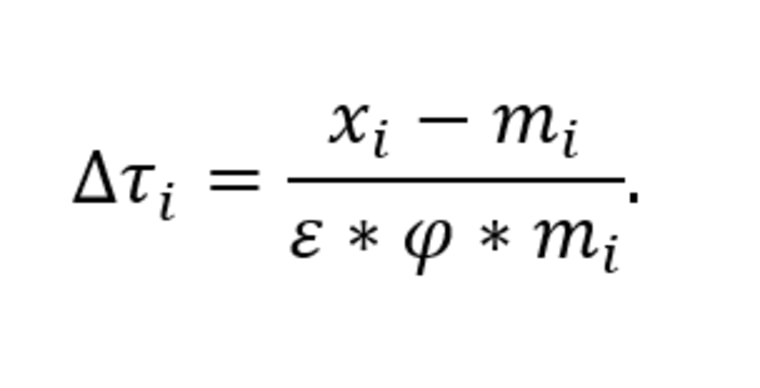
The White House has denied its tariff number is based off simply dividing the trade deficit by a country’s imports. But if you read a little further down the page, everything becomes much simpler.Â
ε (sigma) and φ (phi) seem like complicated variables that would make solving this equation difficult for anyone except a mathematician. But according to the trade rep’s own explanation, the numbers those variables represent cancel each other out.Â
“The price elasticity of import demand, ε, was set at 4. … The elasticity of import prices with respect to tariffs, φ, is 0.25.â€
Where those numbers sit in the formula is important, because they are multiplied together. That cancels the 2 out because 4 multiplied by 0.25 equals 1, and 1 times any other number is equal to that number.Â
So you get left with this formula: The tariff rate for a certain country is equal to the trade deficit divided by the part we can tax, the imports, divided by two. (That’s because the formula finds the tariff rate the White House claims America is being charged by these countries, and is levying its “reciprocal†tariffs on half that number.)
The Economist calls Trump plan 'most profound' error in modern times
The Economist magazine is out with a new cover responding to Trump's tariffs announcement. In an X post, it said the president had "committed the most profound, harmful and unnecessary economic error in the modern era. Almost everything he said—on history, economics and the technicalities of trade—was utterly deluded."
Russell 2000 drops more than 6.5% in sign smaller corporations most at risk from tariffs
The Russell 2000, an index particularly focused on smaller companies, fell by at least 6.5% this morning.
This is a harder dip than some of the broader indexes that track some of the top global corporations, such as the S&P 500. Such a dramatic dip post-tariff implementation could mean that investors see smaller businesses as the most at risk from the new economic policy.
France's Macron calls for U.S. investment halt
Trump’s declarations are a shock for international trade, not only for the European Union and France, French President Emmanuel Macron said Thursday, adding that it would require a French and E.U. mobilization.
Last night’s tariff’s decision is “brutal and unfounded," and will affect every sector, Macron said.
The French president warned that the U.S. economy would be hit, and that American citizens or companies will come out weaker and poorer than yesterday.
Apple heads for worst drop in 5 years after Trump tariff rollout
Technology stocks plummeted today after President Donald Trump’s new tariff policies sparked widespread market panic.
Apple led the declines among the “Magnificent Seven,†dropping nearly 9%. The iPhone maker makes its devices in China and other Asian countries. The stock is on pace for its steepest drop since 2020.
Other megacaps also felt the pressure. Meta Platforms and Amazon fell more than 7% each, while Nvidia and Tesla slumped more than 5%. Nvidia builds its new chips in Taiwan and relies on Mexico for assembling its artificial intelligence systems. Microsoft and Alphabet both fell about 2%.
Semiconductor stocks also felt the pain, with Marvell Technology, Arm Holdings and Micron Technology falling more than 8% each. Broadcom and Lam Research dropped 6%, while Advanced Micro Devices declined more than 4%. Software stocks ServiceNow and Fortinet fell more than 5% each.
Senators introduce bipartisan bill to limit president’s tariff powers
Sen. Chuck Grassley, R-Iowa, and Sen. Maria Cantwell, D-Wash., introduced a bill today to reassert Congress’s power over tariffs.
The Trade Review Act of 2025 says that a president must notify Congress on new tariffs within 48 hours of imposition. And it requires Congress to approve them within 60 days or they expire.
“For too long, Congress has delegated its clear authority to regulate interstate and foreign commerce to the executive branch,†Grassley, a Trump ally who’s skeptical of tariffs, said in a statement. “Building on my previous efforts as Finance Committee Chairman, I’m joining Senator Cantwell to introduce the bipartisan Trade Review Act of 2025 to reassert Congress’ constitutional role and ensure Congress has a voice in trade policy.â€
Eurasia Group president equates tariffs to Brexit
Ian Bremmer, a political scientst and founder of the Eurasia Group, a political research firm, wrote on X that there are similarities between Trump's tariffs and Brexit.
Brexit is shorthand for the move by the U.K. to pull back from closer economic ties with Europe. That move has generally been regarded as a mistake, with declines in trade hampering the regional economy.
Layoffs planned at Stellantis assembly plants in the U.S.
Stellantis said today that it was temporarily laying off 900 workers at five U.S. facilities after President Donald Trump’s tariffs were announced, and temporarily pausing production at an assembly plant in Mexico and Canada.
The U.S. plants affected are powertrain and stamping facilities. Stellantis’ Toluca Assembly, where the Jeep Compass and Jeep Wagoneer S are made, will be down the month of April, the company said.
Stellantis announces production halt at Canadian plant
The maker of Chrysler, Jeep and Ram vehicles told union workers in Windsor, Ontario, it would shut down an assembly plant there for two weeks beginning on April 7 because of Trump's tariffs on automobiles, according to the Toronto Star newspaper and other news outlets.
Stellantis manufactures the Chrysler Pacifica minivan and the all-electric Dodge Charger Daytona at the Windsor plant. The company said more changes are "expected in coming weeks," the newspaper reported.
The 25% tariff on all vehicles produced outside of the United States went into effect today.

U.S. stocks plunge just minutes into trading day as tariffs wreak global havoc on markets
U.S. stocks plunged at the opening bell today after Trump rocked global markets by announcing tariffs on almost all imports into the country.
The S&P 500 tumbled 3.3%, the Dow Jones Industrial Average fell 2.6%, and the tech-heavy Nasdaq sold off by 4.3%. Those market swings wiped out trillions of dollars of value in the first few minutes of trading.
Retail stocks were among some of the hardest hit, as Trump’s tariffs on major manufacturing and exporting nations such as China could reach as high as 54%.
Lululemon plummeted 10%, Nike dropped 11%, and Ralph Lauren declined around 11.5%.
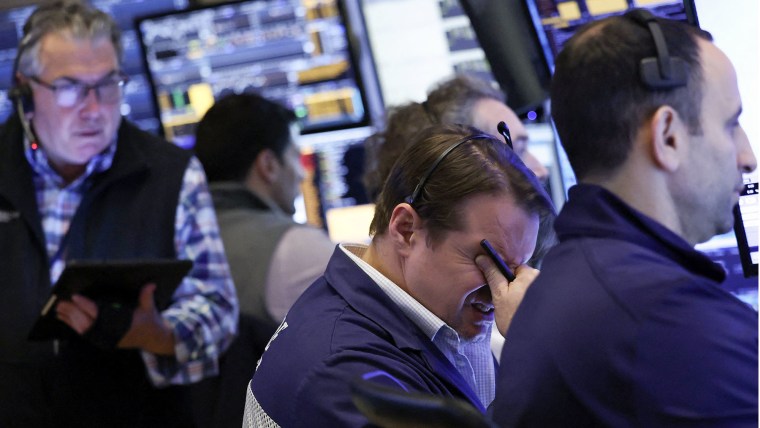
Switzerland not planning retaliation for now
Switzerland’s government today described the trade tariffs imposed against it by Trump as incomprehensible, but said it did not currently plan retaliatory measures in response.
Trump imposed a 31% tariff on imports from Switzerland, compared with 20% on goods from the European Union and 10% from Britain.
Trump reps send mixed-messages on possibility of negotiating tariffs
Trump surrgoates were sending mixed messages in the wake of his shock tariffs announcement yesterday.
On X, Eric Trump, the president's second-oldest son and the principal of The Trump Organization, predicted talks would commence.
"I wouldn’t want to be the last country that tries to negotiate a trade deal with @realDonaldTrump," he wrote. "The first to negotiate will win — the last will absolutely lose. I have seen this movie my entire life … "
But on CNN, White House Press Secretary Karoline Leavitt said there would be no negotiations. She urged Wall Street to “trust in President Trump†and rejected the idea that Trump would pull back on tariffs before they go into effect.
“The president made it clear yesterday this is not a negotiation — this is a national emergency,†she said.
Demand for U.S. government bonds surge in anticipation of slower growth
Investors seeking protection from falling equity prices — and a now substantially reduced global growth outlook — were heavily bidding up U.S. government bonds today.
Trump has sought to lower what is known as the yield on the government's benchmark asset, the 10-year Treasury note. It helps determine borrowing rates elsewhere, most importantly for mortgage rates. When growth is more balanced and sustainable, lower rates help encourage economic activity.
When demand for bonds increases, their prices increase as their yields fall.
But in this case, investor demand is being driven by fears of a worldwide economic slowdown — and a possible U.S. recession. Alongside the bond demand are increased bets that the Federal Reserve will now cut rates as economic activity slows.
“It looks like we’re cruising to recession now unless things change,â€Â Bob Michele, global head of fixed income at JPMorgan Asset Management, said on Bloomberg TV today. He said that any boost to inflation from the tariffs would now likely be short-lived, and that “the Fed can bring down rates a lot.â€
Trump after rolling out tariffs: 'The patient lived, and is healing'
President Trump, seemingly referring to the U.S. economy or markets, took to Truth Social to post: "THE OPERATION IS OVER! THE PATIENT LIVED, AND IS HEALING. THE PROGNOSIS IS THAT THE PATIENT WILL BE FAR STRONGER, BIGGER, BETTER, AND MORE RESILIENT THAN EVER BEFORE. MAKE AMERICA GREAT AGAIN!!!"
At the time of Trump's post, S&P 500 stock futures were down more than 3.5% and the Dow was set to plunge about 1,300 points at the opening bell.
Lutnick: Why can't iPhones be made in America?
Commerce Secretary Howard Lutnick said on CNBC that the U.S. appreciates countries that buy our goods but the administration is really looking at increasing production at home "for people to get jobs."
However, Lutnick continued: "We all hold our iPhones, which we love. Why do they have to be made in Taiwan and China? Why can't those be made with robotics in America?"
Commerce secretary to U.S. trading partners: 'Stop picking on us'
Commerce Secretary Howard Lutnick says he expects the main result of Trump's tariffs to be that other countries will re-examine their trading policies with regard to accepting imports of goods from the United States.
"And stop picking on us. Stop saying that we can't sell our corn to India, stop saying that we can't sell our beef anywhere. Just stop treating us so poorly," Lutnick added.
Canada says it will fight U.S. tariffs with countermeasures
Canada will fight U.S. tariffs with countermeasures, Prime Minister Mark Carney said yesterday, though the White House didn’t roll out additional levies on Canadian imports in Trump’s highly anticipated massive tariffs plan.
While Canada is not among the 185 nations facing Trump’s newly announced “reciprocal†tariffs, the 25% duties slapped on Canadian goods remain in place and the 25% auto tariffs would also begin soon, Carney told reporters.
“We are going to fight these tariffs with countermeasures,†Carney said. “We are going to protect our workers, and we are going to build the strongest economy in the G7.â€
He said U.S. tariffs will “directly affect millions of Canadians.â€
“In a crisis, it’s important to come together,†he added. “It’s essential to act with purpose and with force. And that’s what we will do.â€
Australian PM: 'This is not the act of a friend'
Australia’s Prime Minister Anthony Albanese said that Trump’s 10% tariffs on the country are “not the act of a friend†but added that he won’t retaliate against the U.S.
“This is not the act of a friend,†Albanese told reporters. “The administration’s tariffs have no basis in logic, and they go against the basis of our two nation’s partnership.â€
However, he said Australia won’t join a “race to the bottom that leads to higher prices and slower growth†for the country’s households.
Trump singled out Australia’s ban on the import of U.S. beef as the reason for what he called a “reciprocal tariff.†In 2003, Australia prohibited fresh beef imports from the U.S. due to the detection of mad cow disease in U.S. cattle.
Australia charge no duties on U.S. imports, Albanese said. adding that a “reciprocal tariff would be zero, not 10%.â€
U.S. stocks set to plunge Thursday
Major U.S. stock indexes were set to plunge Thursday in the wake of Trump's shock tariffs announcement, with some $2 trillion in market value set to be erased from the S&P 500, according to Bloomberg News calculations.
S&P 500 futures were off 3.3%. Nasdaq futures were down 3.8%. Dow Jones Industrial Average futures declined 2.8%, or more than 1,100 points.
More than 90% of companies in the S&P 500 were lower in premarket trading, with more than half down at least 2%.
Trump's history-making tariffs in a chart
A chart from Evercore ISI, an investment banking firm, highlights just how big Trump's tariffs are.
The firm below charts average U.S. tariffs, with the sizable and historic Smoot-Hawley Act toward the left. To the right, you can see just how aggressive Trump's tariff plan is: Evercore estimates that U.S. tariffs will exceed a weighted average of 25% — well above Smoot-Hawley.
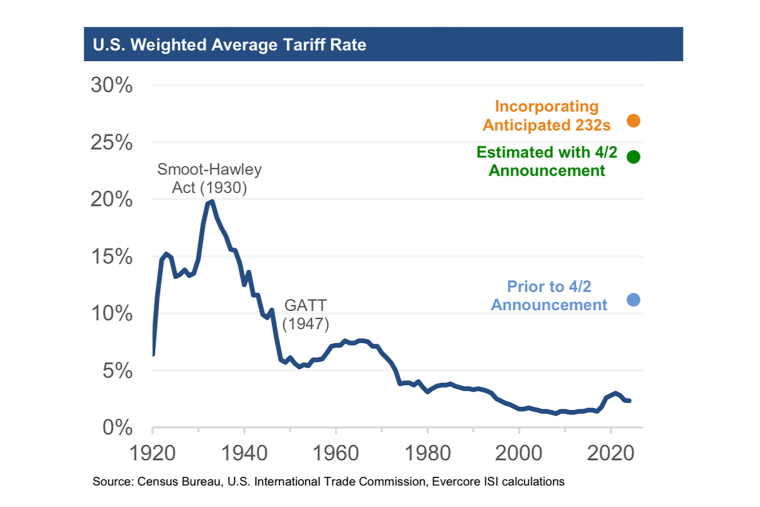
U.K. stocks fall as Starmer hopes to reach a trade deal
Despite only meeting the baseline 10%, Trump's reciprocal tariffs led to shares in London falling Thursday, stoking widespread fears of a global recession.
The FTSE 100 stock index still fell 1.4% as of 10:27 a.m. GMT (5:27 a.m. ET), while the FTSE 250 index dropped 1.3%.
London felt the soft impact of Trump's announcement after being hit with the lowest import duty rate of 10% — which it said was the result of the country's efforts to strike a new trade partnership with the U.S.
“Nobody wins in a trade war. That is not in our national interest,†British Prime Minister Keir Starmer said in a statement Thursday, adding, “I will only strike a deal if it is in the national interest.â€
Following Trump's announcement, Starmer met with business leaders in Downing Street, where he warned them, “Clearly, there will be an economic impact from the decisions the U.S. has taken, both here and globally.â€
Britain’s already-sluggish economy is vulnerable to a global economic slowdown due to its manufacturing sector forming part of the European supply chain, though its exports are mostly in services.
The British government will consider responding to Trump's measures "with a cool head," Starmer said Thursday, with hopes that a new trade deal could see tariffs on British exports lifted.
From Negronis to Guinness, Americans can expect to pay more at the bar
Among the latest round of sweeping reciprocal tariffs imposed by President Trump was also a 25% levy on all U.S. beer imports, affecting Mexican Corona, Dutch Heineken and Irish Guinness.
While industry experts were relieved that Trump's threats of a 200% tariff on European alcohol did not materialize Thursday, along with 25% tariffs on Mexican tequila and Canadian whiskey, they warned that the tariffs will likely still hit sales among U.S. drinkers for European makers of wine and spirits, which amounted to 2.9 billion euros ($3.18 billion) of exports last year.
Italian trade association Federvini president Micaela Pallini warned Thursday that production of drinks like champagne and Scotch whisky cannot move from specific countries or regions.
“Many labels, which cannot be replaced by local production, will disappear from the tables of U.S. consumers, while a serious production and employment crisis is looming in Italy and Europe,†Pallini said in a statement, according to Reuters.
In March, Diageo, which sells billions of dollars worth of tequila and Canadian whisky in the U.S., wrote a letter to the U.S. Trade Representative suggesting an alternative to tariffs, where it implored the government to consider tougher rules of origin requirements in trade agreements.
It warned that Trump’s tariffs on Mexico and Canada could result in a $200 million hit to operating profit in the company’s second half alone.
Meanwhile, Japanese drinks maker Suntory said it would now focus on selling its spirits in countries where they were originally produced.
Stateside, the president and CEO of the Distilled Spirits Council of the United States, Chris Swonger, said the decades-long, mostly zero-for-zero tariffs in the spirit industry had benefitted the U.S. and warned that U.S. jobs linked to European spirits imports would also be under threat.
U.S. layoffs surged in March thanks to DOGE cuts: Report
Federal job cuts resulted in the U.S. seeing the third-highest number of layoffs ever recorded in a single month in March, according to a report from jobs and career consultancy Challenger, Gray & Christmas, Inc.
The report said cuts enacted by the Department of Government Efficiency, the effort spearheaded by Elon Musk that's helped scramble the federal workforce, had resulted in 216,215 layoff plans of federal workers and contractors impacting 27 agencies.
In total, 275,240 cuts were registered across the U.S. economy.
“Job cut announcements were dominated last month by Department of Government Efficiency [DOGE] plans to eliminate positions in the federal government. It would have otherwise been a fairly quiet month for layoffs,†Andrew Challenger, senior vice president and workplace expert for Challenger.
So far this year, employers have announced 497,052, the highest year-to-date and quarterly total since Q1 2009, Challenger said.
The U.S. Bureau of Labor Statistics is slated to release its official monthly jobs report for March tomorrow. Expectations are for approximately 140,000 payrolls added.
Trump wants Europe to pay more tariffs — and up its defense budget
Trump's tariffs on the European Union will hit the economic growth of Belgium, one of its members, at a time when the U.S. is demanding European partners step up defense spending, Belgian Foreign Minister Maxime Prevot said today.
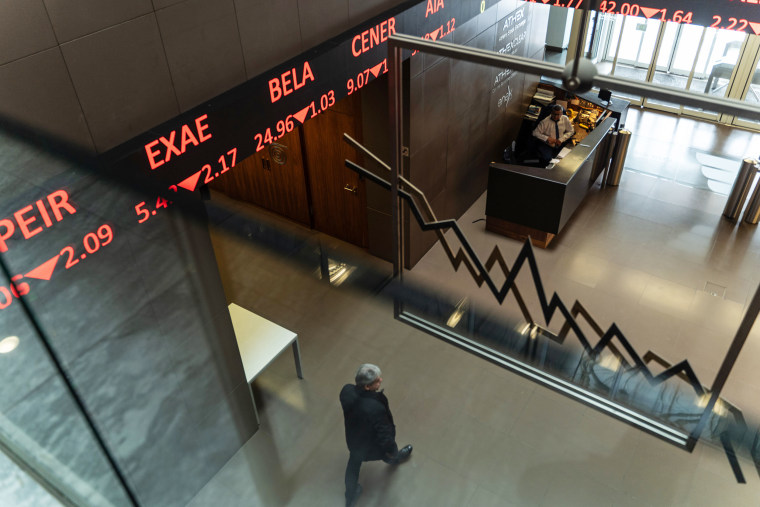
“It will, one way or another, hit not only Belgian companies but also our citizens, partly due to a lesser economic growth ... and that at a moment where the same United States demands an increase in defense spending,†Prevot said in a statement, according to Reuters.
The Belgian government announced in February that it would accelerate defense spending by 4 billion euros ($4.2 billion) in the coming months, in order to meet the minimum 2% increase in defense spending agreed to by NATO allies.
The U.S. is Belgium’s fourth-largest export market and crucial for its pharmaceutical and chemical sectors.
Trump's 46% Vietnam tariff could hit Nike, American Eagle among others
In recent years, retailers and brands have turned to Vietnam to manufacture goods from sneakers to couches while moving some or all production out of China.
China’s southern neighbor became a popular alternative for companies trying to avoid the crossfire of U.S. trade tensions with Beijing. Now, as Trump expands his tariff targets, they can no longer steer clear.
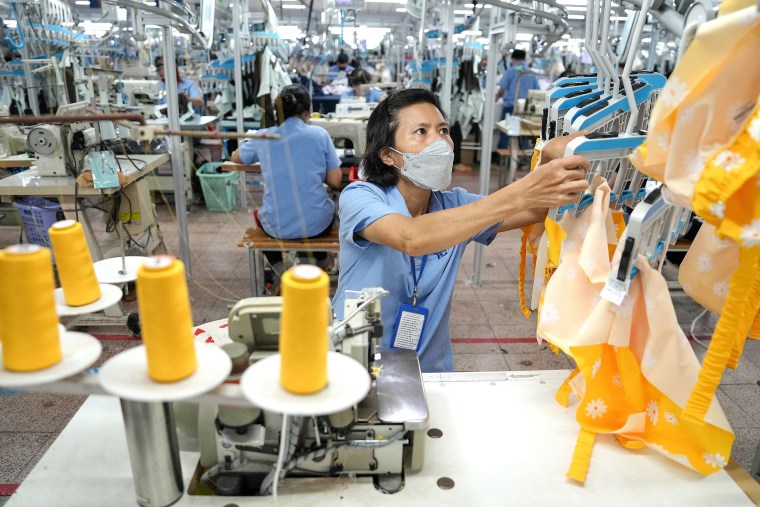
Trump said he will put a 46% duty on imports from Vietnam as part of a new wave of global levies announced yesterday. That could soon raise costs for major corporations in the apparel, furniture and toy space, and some of them may pass those increases to consumers in the form of price hikes. The tariffs on Vietnam take effect April 9.
China exported more goods to the U.S. than any other country for more than two decades, but Mexico surpassed China as the top source in 2023. China is now the second-largest supplier to the U.S., accounting for $438.9 billion worth of goods in 2024, according to government data from the Office of the U.S. Trade Representative.
For companies that have looked to diversify the countries they rely on for production and reduce risks from trade conflicts with China, Vietnam has also become a popular place to go. Imports from Vietnam grew to $136.6 billion in 2024, up about 19% from 2023.
Her great-grandfather was behind the Smoot-Hawley Tariff Act. She thinks Trump’s tariffs are ‘terrible.’
Carey Stewart Cezar, a retired nurse who lives in Baltimore, watched with dismay yesterday as Trump announced sweeping tariffs on imports.
Cezar voted for then-Vice President Kamala Harris in last year’s presidential election and opposes Trump’s economic policies. But she said she has another reason to be skeptical of Trump’s tariffs: She is a descendant of one of the legislators behind the Smoot-Hawley Tariff Act of 1930, a law that many economic historians believe worsened the Great Depression.

“I think it’s a terrible idea and potentially devastating,†Cezar, 70, said in a phone interview yesterday, a few hours after Trump announced plans to impose duties on goods brought into the United States from other countries. “I think people don’t remember all the harm caused by tariffs in our history.â€
Cezar’s great-grandfather Rep. Willis C. Hawley, an Oregon Republican, sponsored the 1930 tariff act with Sen. Reed Smoot, a Utah Republican. The act, which President Herbert Hoover signed into law roughly a year into the Great Depression, increased duties, set off a trade war and — in the eyes of many historians — aggravated the effects of the era’s economic downturn.
Australia's beef farmers shrug at Trump's levies
Trump singled out Australian beef exports while slapping a 10% tariff on all Australian products.
“They’re wonderful people, and wonderful everything — but they ban American beef," Trump said in his Rose Garden speech. “They don’t want it because they don’t want it to affect their farmers and I don’t blame them but we’re doing the same thing right now, starting at midnight tonight, I would say,†he added.

The U.S. is Australia's largest red meat market, importing a record 400,000 tons of Australian beef worth $2.52 billion last year. Since 2003, the country has banned the imports of fresh beef from the U.S. after a mad cow disease outbreak in U.S. cattle.
American fast-food chains rely on Australian beef for its lower fat content, which enables them to achieve an ideal fat content of 30% or less, as mandated by the U.S. Agriculture Department.
That means Australian beef farmers aren't too fazed by the 10% tariff, which is identical to export rivals Brazil and Argentina.
“[American buyers] are completely reliant on our grass-fed beef and some of our high quality grain-finished beef to meet their requirements of their domestic consumers,†Garry Edwards, chair of industry body Cattle Australia, told Reuters.
“I can’t imagine that the American consumer is going to like paying more for their burgers or their steaks for the foreseeable future,†he added.
Australian Trade Minister Don Farrell said last month that higher tariffs on beef could push up the price of McDonald's hamburgers, while Prime Minister Anthony Albanese said today that the government would assist any industries impacted by the tariffs to sell into alternative markets.
De minimis trade loophole boost to Chinese e-commerce to end May 2
Trump yesterday signed an executive order shutting the de minimis trade loophole, effective May 2.
Trump in February abruptly ended the de minimis trade exemption, which allows shipments worth less than $800 to enter the U.S. duty-free. The order overwhelmed U.S. Customs and Border Protection employees and caused the U.S. Postal Service to temporarily halt packages from China and Hong Kong. Within days of its announcement, Trump reversed course and delayed the cancellation of the provision.
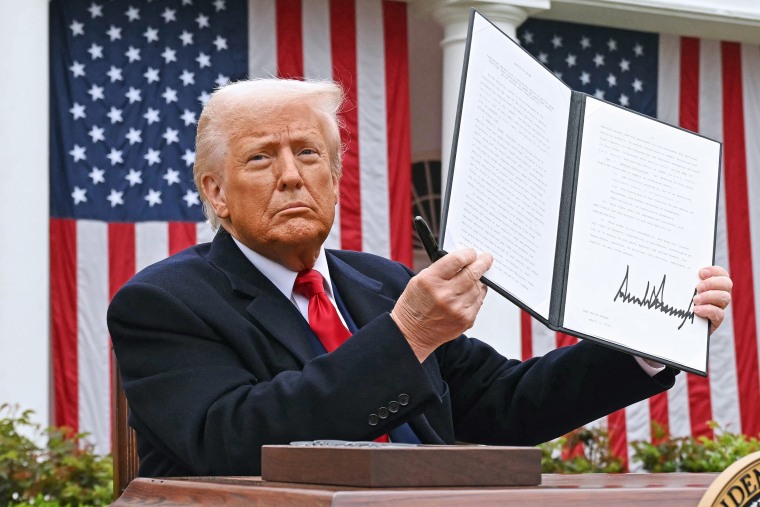
Yesterday’s announcement, which came alongside a set of sweeping new tariffs, gives customs officials, retailers and logistics companies more time to prepare. Goods that qualify under the de minimis exemption will be subject to a duty of either 30% of their value, or $25 per item. That rate will increase to $50 per item June 1, the White House said.
Use of the de minimis provision has exploded in recent years as shoppers flock to Chinese e-commerce companies Temu and Shein, which offer apparel at ultra low cost, electronics and other items. U.S. Customs and Border Protection has said it processed more than 1.3 billion de minimis shipments in 2024, up from more than 1 billion shipments in 2023.
Not even the cheesemakers escape as tariffs sour Greek feta
Greek Finance Minister Kyriakos Pierrakakis said today that the new Trump administration tariffs signal a historic shift toward protectionism and deviate from the European Union's view of economic and social progress.
“As a country, we are in favor of free trade,†Pierrakakis said in a statement, according to Reuters, adding that “we hope that this chapter will last as little as possible.â€
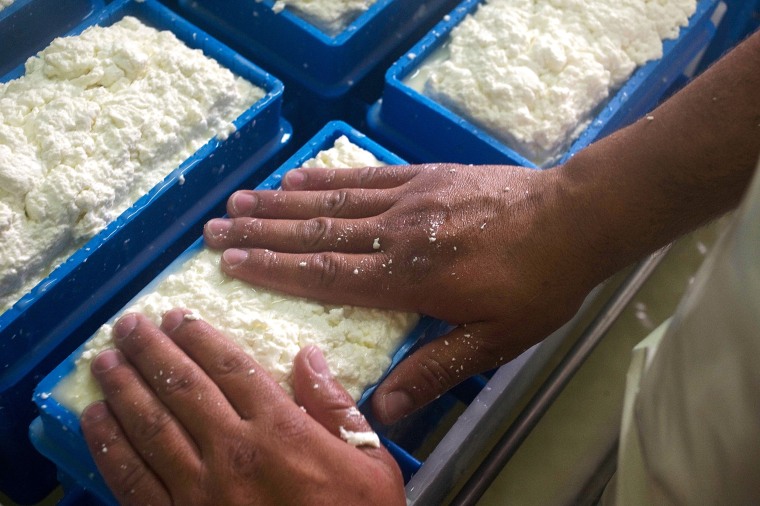
Trump's decision to slap a 20% tariff on the European Union has shaken the country's feta cheese producers, who were exempt from U.S. tariffs imposed in European goods in 2019.
“I’m afraid feta will not find a way out of these tariffs this time,†said Christos Apostolopoulos, head of Greece’s association of dairy industries, according to Reuters. “We have to figure it out, how to divert these quantities to other markets.â€
Feta, a protected E.U. trademark since 2022, has been produced in Greece for more than 6,000 years. The country produced some 138,000 tons of feta worth 800 million euros ($882 million) last year, with around 8% of its exports reaching the U.S.
Trump administration slaps tariffs on some of the world's poorest nations
Reporting from Washington
Many of the world’s poorest countries now face the highest tariffs imposed by Trump yesterday.
Lesotho in southern Africa has been slapped with the highest duty of 50%. Listed as the world’s 22nd poorest country, it primarily exports diamonds and garments, with the U.S. as one of the top five exporting destinations.
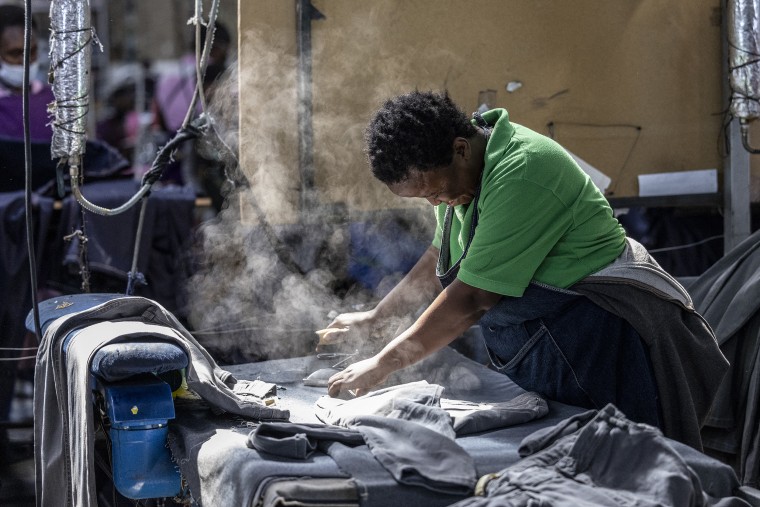
Cambodia is hit by 49% U.S. tariffs, the second highest, though the U.S. is Cambodia’s largest single-country export destination.
Madagascar in East Africa, the world’s ninth-poorest country, will face 47% reciprocal tariffs. It primarily exports vanilla, cloves and garments, with the U.S. among the top five countries it exports to.
America's foes escape tariffs — because they're already sanctioned
Reporting from Washington
Trump may have threatened over the weekend to put secondary tariffs on Russian oil, but Russia isn’t among the 185 countries affected by the newest round of U.S. levies announced yesterday.
Russia is not on the list because of heavy sanctions on the country due to the Ukraine-Russia war and the U.S. currently has no trade with it, the White House told NBC News. The value of U.S.-Russia trade plunged from about $35 billion in 2021 to $3.5 billion last year, after the Biden administration introduced the measures.
While Trump promised to slap “reciprocal†tariffs on both friends and foes, he also left out Cuba, Belarus and North Korea.
Trump told NBC News on Sunday that if he believes Russia is at fault for a ceasefire not reached with Ukraine, he may impose secondary tariffs on Russian oil.
‘Major blow to the world economy’: Global leaders react to Trump’s tariffs
India's pharma industry helps cushion 26% tariff blow to its stock market
India’s shares fell Thursday after President Trump slapped a 26% tariff on India, but a comparatively lower tariff rate than neighboring China and duty exemptions on pharma companies helped cushion the blow by giving the country a comparative edge.
The Nifty 50 Indian index of India's largest stocks was trading 0.2% lower at 10:45 a.m. local time (1:15am ET), while the BSE Sensex, the country's largest index, fell 0.27%, according to Reuters. On a day when indices around the world are flashing red, those losses are relatively tiny.
Meanwhile, the country's pharma index jumped 2.6% after Trump exempted pharmaceutical products from the list of imports hit by tariffs.
The Indian trade ministry said Thursday it was “carefully examining†the implications of Trump’s tariff announcement, adding that ongoing talks between the U.S. and India were focused on “enabling both countries to grow trade, investments and technology transfers.â€
Chinese auto part suppliers say Americans are picking up the tab for Trump’s tariffs
Reporting from Beijing
If you’ve ever fixed your own car brakes, the part you bought could very well have been made by Chinese auto parts supplier Judy Zhang.Â
Zhang’s company, which is based in the eastern Chinese city of Qingdao and supplies brake hoses for thousands of car models in the U.S., is among those targeted by a 25% U.S. tariff on imports of automobiles, including automobile parts, that is set to take effect Thursday.

That’s on top of a 25% tariff imposed during President Donald Trump’s first term, plus 20% tariffs he has imposed on Chinese imports since returning to office in January. On Wednesday, Trump announced an additional 34% levy on Chinese imports as part of “reciprocal†tariffs imposed on countries around the world, bringing the total combined tariff on Chinese goods to at least 54%.
Though Trump insists that China, among other countries, will pay for the U.S. tariffs, Zhang and other auto parts suppliers say that the tariffs will most likely be shouldered by American consumers and that they won’t bring manufacturing in their industry back to the United States.
Trump's tariffs "wrong" but Europe should avoid a trade war, says Italy’s Meloni
Italy's Prime Minister Giorgia Meloni said the 20% tariff imposed on the EU was “wrong†but added the bloc should try to avert a trade war. Meloni on Thursday cancelled all engagements for the day to focus on Italy's actions in response to U.S. tariffs, the Italian government said in a statement.
“The tariffs are wrong and not in the interest of either party,†Meloni, a close ally of President Trump, said in a post on Facebook on Thursday. “We will do everything we can to work towards an agreement with the United States, with the goal of avoiding a trade war that would inevitably weaken the West in favor of other global players,†she added.

Italy's food and drinks industry will be hit hard by the new tariffs, and Meloni on Wednesday told business leaders in the sector that the EU may need to adopt “appropriate responses,†according to Reuters.
Italian trade association Federvini also said it was bracing to relive the “economic trauma†caused by tariffs in Trump’s first term, when exports fell by 50%.
“Many labels, which cannot be replaced by local production, will disappear from the tables of U.S. consumers, while a serious production and employment crisis is looming in Italy and Europe,†Federvini President Micaela Pallini said in a statement.
Unpopulated, remote island not immune from Trump’s tariffs
The sweeping tariffs Trump announced today stretched around the globe, including the remote Heard and McDonald Islands, which are populated by zero humans but lots of seals and penguins.

Despite having no apparent exports or imports, the sub-Antarctic islands, which are an external territory of Australia, will be subject to a 10% tariff, according to a document the White House provided during Trump’s tariff announcement today.
Other tiny nations and territories were also hit with 10% tariffs, including Tokelau, a dependent territory of New Zealand, with a population of around 1,600 people, and the Cocos Islands, another territory of Australia, with a population of around 600 people.
Japan vows 'necessary measures' but does not say if it will respond with tariffs
Reporting from Tokyo
Calling the U.S. tariffs "extremely regrettable," Japan said it will examine the impact on domestic industries and will take "all necessary measures," including providing support for cash flow.
"We will promptly establish a special consultation service and provide support for cash management and fund procurement," chief cabinet secretary Yoshimasa Hayashi told reporters in a regular news briefing.
Hayashi said he would not disclose the "specifics of what is being considered" when asked if Japan was considering arbitration by the World Trade Organization or reciprocal tariffs.
Japan's Nikkei index closed 2.8% lower Thursday.
France slams Trump's 'imperialist posture' and helps EU ready fight-back
French officials slammed President Trump’s 20% tariff measures on all goods imported from the European Union, saying that the bloc could be expected to retaliate in mid-April, and then again in late April.
The first of the two responses by the EU will tackle Trump’s attacks on aluminum and steel, followed by the broader range of products and services, French government spokesperson Sophie Primas told local broadcaster RTL radio Thursday.
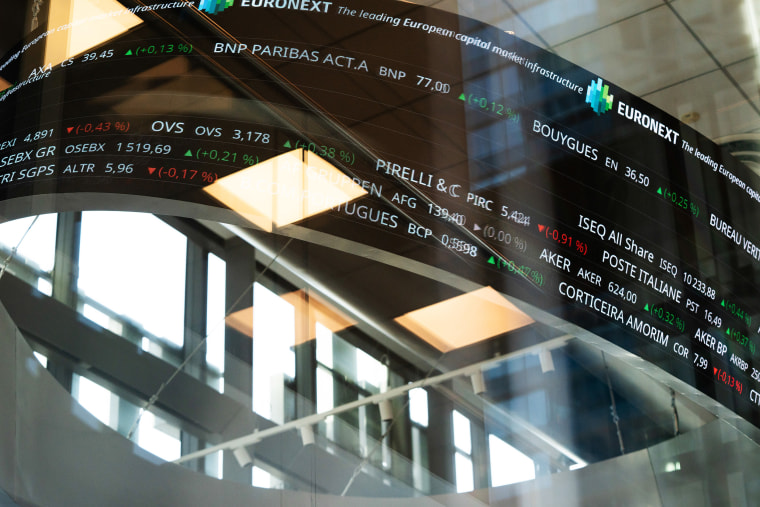
“We are also going to attack services,†she said, including online services from Google, Apple, Facebook, Amazon and Microsoft. She added that the EU would also review access of U.S. companies to procurement contracts in Europe.
France is “ready in this trade war,†Primas said, after accusing Trump of behaving like he’s “master of the world†and of having an “imperialist posture.â€
Vietnam markets drop 7% as Asian stocks take a hit
Reporting from Hong Kong
Markets across Asia slid after some of the highest Trump tariffs targeted countries in the region.
In Vietnam, which was slapped with some of the Trump administration's highest tariffs of 46%, the mains stock index dropped nearly 7% amid fears the levy could impact its manufacturing industry, which is closely tied to American brands like Nike, American Eagle and Wayfair.
Hong Kong's Hang Seng Index stood 1.5% lower this afternoon (local time), and Shanghai's SSE Composite Index was down 0.3%. Japan, where officials urged U.S. to reconsider the 24% levy, the Nikkei 225 index fell by 2.7%.
European markets open to a bloodbath for shares in Germany, industry and retail
Reporting from London
European markets have opened with heavy losses as traders on the continent react to the Trump administration’s global 10% base level tariffs and 20% levies on the European Union.Â
The STOXX Europe 600 Index — a basket of Europe’s largest companies — was down around 1.8% shortly after the open, with Germany’s DAX index the worst hit among the bourses of Europe’s major economies. That’s no surprise given that Germany is the continent’s industrial powerhouse.
The European companies whose share prices have been worst hit by the fresh taxes are retailers popular in the U.S. such as jewelry manufacturer Pandora and sportswear brands Adidas and Puma — stocks in all three companies had dropped 10% shortly after markets opened.
But it’s perhaps in heavy industry where European business will feel the worst of the pain. Engineering firm Siemens was down 4% and steel-maker Thyssen Krupp fell 3.4%. German carmakers — after President Trump imposed huge new tariffs on foreign car imports — suffered losses, with Volkswagen, Mercedes-Benz, BMW and Stellantis all down 2% or more.Â
The U.K.’s major index, the FTSE 100, suffered comparatively small losses of 1.3%. With Trump imposing just the 10% base tariff rate on the British economy, U.K. Prime Minister Keir Starmer told journalists that “nobody wins in a trade war, that is not in our national interest. We have a fair and balanced trade relationship with the US.â€
Starmer added that the U.K. would only make a trade deal with Trump “if it is in our national interest and if it is the right thing to do for the security of working people, protects the pound in their pocket that they have worked hard to earnâ€.
Trump's trade war is just getting started
President Donald Trump has favored tariffs for years. His expanding trade war is sure to ripple through the global economy for a long while, too.
That’s because ramping up tariffs on foreign governments frequently draws retaliation — a likelihood that even industries Trump aims to support are already bracing for. While he has been rolling out an ever-shifting series of import taxes for months, the sweeping “reciprocal†tariffs he announced yesterday are opening salvos in what could become drawn-out tit-for-tats with potentially dozens of governments.
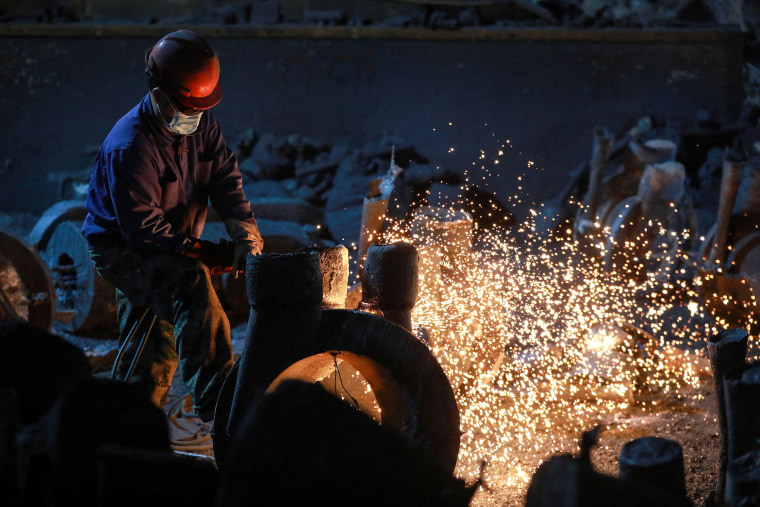
Unlike the narrower, targeted tariffs Trump imposed on certain countries and products in his first term, his latest duties are set to rewrite the rules of global trade on a far broader level — and in an environment in which inflation is running hotter.
“This is a game changer, not only for the U.S. economy but for the global economy,†Olu Sonola, head of U.S. economic research at Fitch Ratings, said in a note Wednesday evening.
“Many countries will likely end up in a recession. You can throw most forecasts out the door, if this tariff rate stays on for an extended period of time,†she said, adding that the levels Trump is introducing haven’t been seen since 1910.
E.U. chief warns of further countermeasures against U.S. tariffs if negotiations fail
The European Union is preparing further countermeasures against U.S. tariffs if negotiations fail, according to European Commission President Ursula von der Leyen.
President Donald Trump had imposed 20% tariffs on the bloc on Wednesday.
Speaking on a livestreamed broadcast, von der Leyen said that Trump’s move was a “major blow†to the world economy.
“There seems to be no order in the disorder, no clear path to the complexity and chaos that is being created as all U.S. trading partners are hit,†she said.
Britain: 'Nobody wants a trade war'
Shortly after Trump’s announcement, the British government said the United States remains the U.K.’s “closest ally.â€
Business Secretary Jonathan Reynolds said the U.K. hoped to strike a trade deal to “mitigate the impact†of the 10% tariffs on British goods announced by Trump.
“Nobody wants a trade war and our intention remains to secure a deal,†said Reynolds. “But nothing is off the table and the government will do everything necessary to defend the U.K.’s national interest.â€
China urges U.S. to cancel tariffs and vows countermeasures
Reporting from Hong Kong
China urged the Trump administration to cancel the new U.S. tariffs and said it would “resolutely take countermeasures†to protect its rights and interests.
The latest round of tariffs leaves China, one of the largest U.S. trading partners, facing the highest U.S. tariff rate with a combined total of at least 54%.
“The so-called ‘reciprocal tariffs,’ based on the U.S.’s own subjective and unilateral assessments, violate international trade rules, severely harm the legitimate rights and interests of other parties, and represent a typical act of unilateral bullying,†the Chinese Commerce Ministry said in a statement.
“Many trading partners have already voiced strong dissatisfaction and clear opposition,†it said, adding that the U.S. should “resolve differences with its trading partners through equal-footed dialogue.â€
Apple led a drop in tech stocks after Trump tariff announcement
Apple slid more than 6% in late trading on Wednesday and led a broader decline in tech stocks after President Donald Trump announced new tariffs of between 10% and 49% on imported goods.
The majority of Apple’s revenue comes from devices manufactured primarily in China and a handful of other Asian countries. Nvidia, which manufactures new chips in Taiwan and assembles its artificial intelligence systems in Mexico and elsewhere, fell about 4%, while electric vehicle company Tesla dropped 4.5%.
Across the rest of the megacap universe, Alphabet, Amazon and Meta all dropped between 2.5% and 5%, and Microsoft was down by almost 2%.
If Apple’s postmarket loss is matched in regular trading on Thursday, it would be the steepest decline for the stock since September 2020.
ING: Tariffs: Europe's worst economic nightmare just came true
The global financial services firm ING said a 20% tariff from the United States on the European Union will hurt.
"It’s worsened the eurozone’s short-term outlook. Now, so much depends on European governments to push through with their planned fiscal stimulus and reforms to strengthen domestic economies," it said.
"Wednesday’s tariff announcements by Donald Trump should be the final reminder for Europe that the Transatlantic relationship has changed for good. And this doesn’t only apply to security and defense policies."
European allies sound off
Ireland Prime Minister Micheál Martin slammed the 20% tariff on imports from across the European Union, calling it "deeply regrettable."
"I strongly believe that tariffs benefit no one. My priority, and that of the government, is to protect Irish jobs and the Irish economy,†he said.
Manfred Weber, the president of the EPP, the European Parliament's largest party, said Wednesday: “To our American friends, today isn’t liberation day — it’s resentment day. Donald Trump’s tariffs don’t defend fair trade; they attack it out of fear and hurt both sides of the Atlantic. Europe stands united, ready to defend its interests, and open to fair, firm talks.â€

























